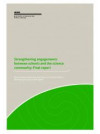This research aimed to generate evidence-based recommendations for strengthening partnerships between schools and the science community to support students’ science learning and engagement. It was underpinned by a future-oriented perspective, framed by larger questions about the purpose of science education in the context of a rapidly changing 21st-century world. The report digs beneath assumptions about why learners’ and teachers’ engagement with the science community is considered important, and examines what kinds of approaches and supports might sustain future-oriented science education for New Zealand learners.
Methodology
The research was carried out in two phases. Phase one comprised a survey of teachers (n = 301), a survey of science community providers who work with schools (n = 43) and a brief literature review. The second phase comprised five case studies of science community engagement initiatives, covering a spread of types across several different regions in New Zealand. The researchers also undertook a small number of focus-group interviews with scientists and science educators, and a more detailed synthesis of the literature to provide a framework for the final data analysis.

